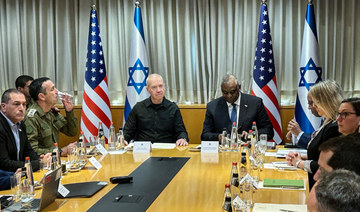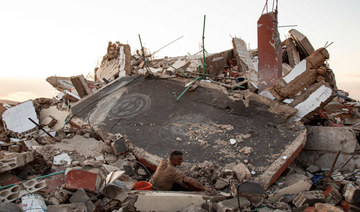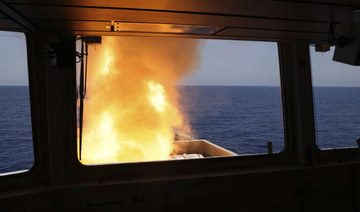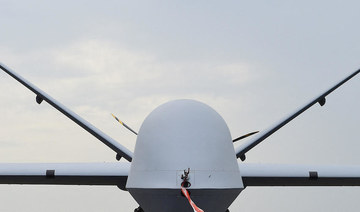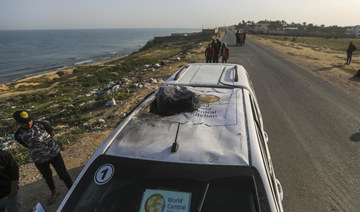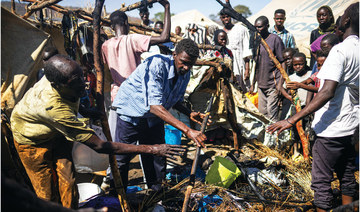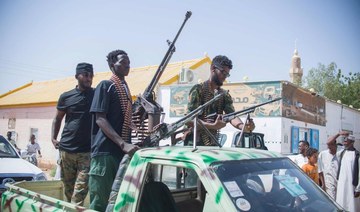TEL AVIV, Israel: The head of the CIA jetted to Europe for talks with Israeli and Qatari officials Monday, sounding out the potential for a deal on a new cease-fire and the release of hostages in Gaza, as the US defense secretary spoke to Israeli military leaders about scaling back major combat operations against Hamas.
Still, there was no sign that a shift in the war was imminent after more than two months of devastating bombardment and fighting. Fierce battles raged in northern Gaza, where residents said rescue workers were searching for the dead and the living under buildings flattened by Israeli strikes.
Pressure is growing, as France, the UK and Germany — some of Israel’s closest allies — joined global calls for a cease-fire over the weekend. Israeli protesters have demanded the government relaunch talks with Hamas on releasing more hostages after three were mistakenly killed by Israeli troops while waving a white flag.
US officials have repeatedly expressed concern about the large number of civilian deaths in Gaza. But after talks with Israeli officials Monday, US Defense Secretary Lloyd Austin said, “This is Israel’s operation. I’m not here to dictate timelines or terms.” The US has vetoed calls for a cease-fire at the UN and has rushed munitions to Israel.
The UN Security Council delayed a vote to Tuesday on an Arab-sponsored resolution calling for a halt to hostilities to allow unhindered access to humanitarian aid in order to try to avoid another veto by the United States. Diplomats said negotiations were taking place to get the US to abstain or vote “yes” on the resolution.
Prime Minister Benjamin Netanyahu has insisted that Israel will keep fighting until it ends Hamas rule in Gaza, crushes its formidable military capabilities and frees hostages still held in Gaza since the deadly Oct. 7 attack inside Israel that ignited the war. In the unprecedented attack, militants killed some 1,200 people, mostly civilians, and abducted around 240 men, women and children.
The war has killed more than 19,000 Palestinians and demolished much of the north into a moonscape. Some 1.9 million Palestinians — nearly 85 percent of Gaza’s population — have fled their homes, with most packing into UN-run shelters and tent camps in the southern part of the besieged territory.
HOSTAGE TALKS
In an apparent sign that talks on a hostage deal were growing more serious, CIA Director William Burns met in Warsaw with the head of Israel’s Mossad intelligence agency and the prime minister of Qatar, a US official said.
It was the first known meeting of the three since the end of a weeklong cease-fire in late November, during which some 100 hostages — including a number of foreign nationals — were freed in exchange for the release of around 240 Palestinian s held in Israeli prisons.
National Security Council spokesperson John Kirby said the talks were not “at a point where another deal is imminent. We are working literally every day on this.”
Aiming to increase public pressure on the Israeli government, Hamas released a video showing three elderly Israeli hostages, sitting in white T-shirts and pleading for Israel to bring their immediate release.
The comments were likely made under duress, but the video signaled Hamas wants to move on to discussions of releasing sick and elderly men in captivity. Israel has said it wants around 19 women and two children freed first. Hamas says the women include soldiers, for whom it is expected to demand a higher price in terms of prisoner releases.
Hamas and other militants are still holding an estimated 129 captives. Hamas has said no more hostages will be released until the war ends.
SCALING DOWN THE WAR
Austin, who arrived in Israel with Joint Chiefs Chairman Gen. CQ Brown, said he and Israeli officials exchanged “thoughts on how to transition from high intensity operations” and how to increase the flow of humanitarian aid to Gaza.
American officials have called for targeted operations aimed at killing Hamas leaders, destroying tunnels and rescuing hostages. Those calls came after US President Joe Biden warned last week that Israel is losing international support because of its “indiscriminate bombing.”
Speaking alongside Austin, Israeli Defense Minister Yoav Gallant said only that “the war will take time.” Last week, Gallant said Israel would continue major combat operations for several months.
Israeli military spokesman Daniel Hagari said the Israeli chief of staff met with Austin and Brown and presented “plans for the continuation of the battle in the coming stages.”
European countries appear to be losing patience. “Far too many civilians have been killed in Gaza,” EU foreign policy chief Josep Borrell posted on X. “Certainly, we are witnessing an appalling lack of distinction in Israel’s military operation in Gaza.”
Under US pressure, Israel provided more precise evacuation instructions earlier this month as troops moved into the southern city of Khan Younis. Still, casualties have continued to mount and Palestinians say nowhere in Gaza is safe as Israel carries out strikes in all parts of the territory.
Israel reopened its main cargo crossing with Gaza to allow more aid in — also after a request from the US But the amount is less than half of prewar imports, even as needs have soared and fighting hinders delivery in many areas. Israel blocked entry off all goods into Gaza soon after the war started and weeks later began allowing a small amount of aid in through Egypt.
Human Rights Watch on Monday accused Israel of deliberately starving Gaza’s population — which would be a war crime — pointing to statements by senior Israeli officials expressing the intent to deprive civilians of food, water and fuel or linking the entry of aid to the release of hostages.
UNPRECEDENTED DEATH AND DESTRUCTION
At least 110 people were killed in Israeli strikes Sunday on residential buildings in the urban Jabaliya refugee camp in northern Gaza, Munir Al-Boursh, a senior Health Ministry official, told Al Jazeera television.
Fierce fighting continued Monday in Jabaliya and the Gaza City districts of Zaytoun and Shijaiyah, where tens of thousands of Palestinians remain trapped, crowded in homes or schools.
In Jabaliya, first responders and residents searched the rubble of many collapsed buildings. “They use their hands and shovels,” said Amal Radwan, who is staying at a UN shelter there. “We need bulldozers and above all the bombing to stop.”
More than 19,400 Palestinians have been killed, according to the Health Ministry, which has said that most are women and minors and that thousands more are buried under rubble. The ministry does not differentiate between civilian and combatant deaths.
Israel’s military says 127 of its soldiers have been killed in the Gaza ground offensive. It says it has killed thousands of militants, without providing evidence.
Israel blames civilian deaths on Hamas, saying it uses them as human shields. But the military rarely comments on individual strikes.
REGIONAL TENSIONS
Yemen’s Houthi rebels continued attacks on shipping in the Red Sea in a campaign that has prompted a growing list of companies to halt their operations in the major trade route. The latest company was oil and natural gas giant BP, which said Monday it was suspending shipments through the Red Sea.
Austin said early Tuesday that the US, United Kingdom, Bahrain, Canada, France, Italy, Netherlands, Norway, Seychelles and Spain have created a new force to protect ships passing through the Red Sea. Some of the countries will conduct joint patrols while others will provide intelligence support in the southern Red Sea and the Gulf of Aden.
“This is an international challenge that demands collective action,” Austin said in statement released just after midnight in Bahrain.
Israel and Lebanon’s Hezbollah have traded fire along the border nearly every day since the war began. In the Israeli-occupied West Bank, over 300 Palestinians have been killed since the start of the war, including four overnight during an Israeli military raid in the Faraa refugee camp, according to the Palestinian Health Ministry.
This has been the deadliest year for Palestinians in the West Bank since 2005. Most have been killed during military raids, which often ignite gunbattles, or during violent demonstrations.
US envoys work for new hostage release deal, scale-down of Israel-Hamas war but say no timetable
https://arab.news/49wqx
US envoys work for new hostage release deal, scale-down of Israel-Hamas war but say no timetable
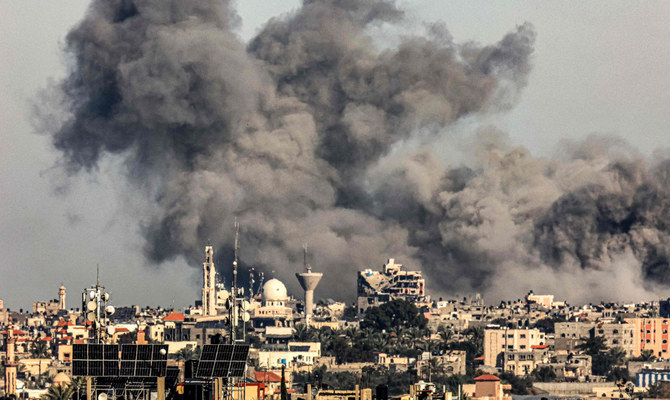
- There is no sign that a shift in the war is imminent after more than two months of devastating bombardment and fighting
Head of UAE national media officer meets with Saudi, GCC ministers

- Discussed ways to strengthen media cooperation between GCC countries
DOHA: The head of the UAE’s national media office met with informational ministers from Gulf Cooperation Council countries in Doha on Friday, Emirates News Agency reported.
Sheikh Abdulla bin Mohammed Al-Hamed, who is also chairman of the UAE Media Council, met with Saudi Arabia’s media minister Salman bin Yousef Al-Dosari and Abdulrahman Bdah Al-Mutairi, the Minister of Information and Culture of Kuwait.
Sheikh Abdulla also held talks with Ramzan bin Abdullah Al-Noaimi of Bahrain and Sheikh Hamad bin Thamer Al-Thani, chairman of Qatar Media Corporation.
They discussed ways to strengthen media cooperation between the GCC countries and developing joint initiatives to advance the media industry in the region.
Yemen’s Houthis say they launch attacks on 3 ships including one in Mediterranean
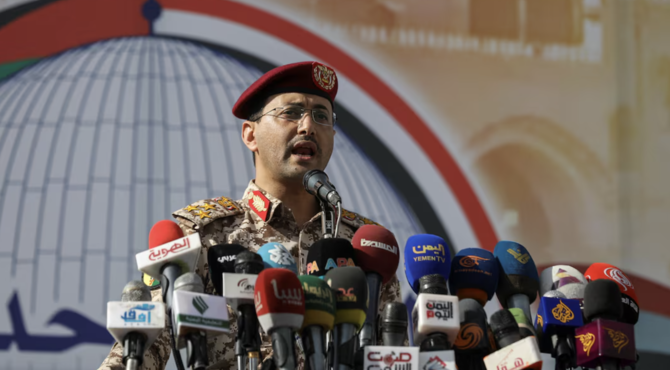
- Attacks are latest in months-long campaign of Houthi strikes against regional shipping
CAIRO: Yemen’s Houthis have launched attacks on three ships in the Red Sea, Mediterranean Sea and Arabian Sea, the Iran-aligned group’s military spokesman Yahya Sarea said on Friday.
The attacks are the latest in a months-long campaign of Houthi strikes against regional shipping in what the group says is solidarity with Palestinians fighting Israel in the Gaza war.
Sarea said in a televised speech that Houthi forces had targeted the Yannis ship in the Red Sea, the Essex in the Mediterranean Sea and MSC Alexandra in the Arabian Sea.
Houthis “fired several missiles at the ship Essex in the Mediterranean Sea while it was violating the decision ban that prevents entry into occupied Palestinian ports,” Sarea added.
He did not clarify when the attacks took place.
Earlier this month, the leader of Yemen’s Houthis, Abdul Malik Al-Houthi had said that all ships heading to Israeli ports would be attacked by the Iran-backed group, not just those in the Red Sea region which it has sought to strike before.
The Iran-aligned Houthi militants have launched repeated drone and missile strikes on ships in the crucial shipping channels of the Red Sea, the Bab Al-Mandab strait and the Gulf of Aden since November to show their support for the Palestinians in the Gaza war.
This has forced shippers to re-route cargo to longer and more expensive journeys around southern Africa and has stoked fears that the Israel-Hamas war could spread and destabilize the Middle East.
Food bound for Gaza rots in the sun as Egypt’s Rafah crossing stays shut
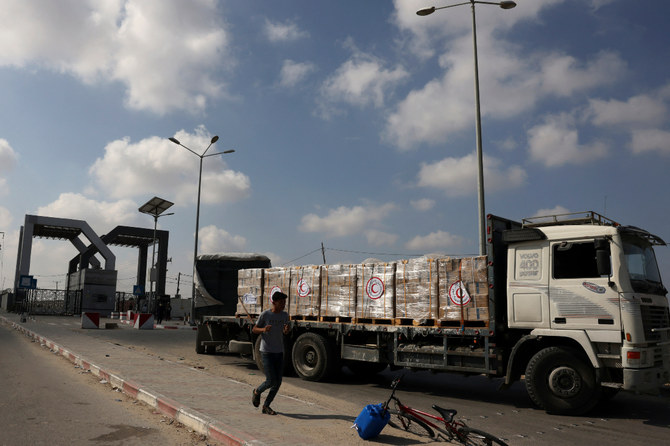
- Trucks halted since Israel stepped up offensive in Rafah
- Some supplies stuck for more than two months
- Health warning issued for some food inside Gaza
AL-ARISH, Egypt: Some of the food supplies waiting to enter the Gaza Strip from Egypt have begun to rot as the Rafah border crossing remains shut to aid deliveries for a third week and people inside the Palestinian enclave face worsening hunger.
Rafah was a main entry point for humanitarian relief as well as some commercial supplies before Israel stepped up its military offensive on the Gazan side of the border on May 6 and took control of the crossing from the Palestinian side.
Egyptian officials and sources say humanitarian operations are at risk from military activity and that Israel needs to hand the crossing back to Palestinians before it starts operating again.
Israel and the United States have called on Egypt, which is also worried about the risk of Palestinians being displaced from Gaza, to allow the border to reopen.
Meanwhile the backlog of aid on the road between the Egyptian side of the crossing and the town of Al-Arish, about 45 km (28 miles) west of Rafah and an arrival point for international aid donations, has been building up.
One truck driver, Mahmoud Hussein, said his goods had been loaded on his vehicle for a month, gradually spoiling in the sun. Some of the foodstuffs are being discarded, others sold of cheap.
“Apples, bananas, chicken and cheese, a lot of things have gone rotten, some stuff has been returned and is being sold for a quarter of its price,” he said, crouching under his truck for shade.
“I’m sorry to say that the onions we’re carrying will at best be eaten by animals because of the worms in them.”
Aid deliveries for Gaza through Rafah began in late October, two weeks after the start of the war between Israel and Palestinian militant group Hamas.
The flow of relief has often been slowed by Israeli inspections and military activity inside Gaza and the amount reaching the enclave’s 2.3 million residents has been far below needs, aid officials say.
A global hunger monitor has warned of imminent famine in parts of Gaza.
Rotten eggs
Since May 5, no trucks have crossed through Rafah and very few through the nearby Israeli crossing of Kerem Shalom, according to UN data.
The amount of aid waiting in Egypt’s northern Sinai was now very large, and some had been stuck for more than two months, said Khaled Zayed, head of the Egyptian Red Crescent in the area.
“Some aid packages require a certain temperature ... We coordinate on this with specialists who are highly trained in the storage of food and medical supplies,” he said.
“We hope the border will reopen as soon as possible.”
KSrelief, a Saudi-funded charity, has more than 350 trucks carrying items including food and medical supplies waiting to pass through Rafah, but has had to offload flour because of the risk of it rotting, the group’s supervisor general Abdullah Al Rabeeah said.
“We pack and send but also we have to recheck. It is a big burden,” he told Reuters.
Some food has been sold at cut price on the local market in northern Sinai, leading to the confiscation of stocks of rotten eggs, said local officials from Egypt’s ministry of supply.
Inside Gaza, there have also been scares about the quality of delayed food deliveries that made it in before Rafah closed, or through other crossings.
Palestinian medical and police officials that used to check goods coming into Gaza had been unable to do so during Israel’s offensive, said Ismail Al-Thawabta, director of the Hamas-run Gaza government media office.
“There is a big problem as many of the goods that enter the Gaza Strip are unfit for human use and are unhealthy,” he said.
“Therefore, the health ministry issued the warning statement to raise public awareness that people should examine the goods before eating them or sharing them with their families.” (Reporting by Reuters Cairo bureau, Nidal Al-Mughrabi and Emma Farge Writing by Aidan Lewis Editing by Peter Graff)
Macron to host Arab foreign ministers for Gaza talks

Joined by his own top diplomat Stephane Sejourne, Macron will discuss the situation with Qatar’s Mohammed bin Abdulrahman Al-Thani, Egypt’s Sameh Shoukry, Ayman Safadi of Jordan and Saudi Foreign Minister Faisal bin Farhan Al-Saud, the Elysee said.
Tens of thousands flee as paramilitaries attack Sudan’s Al-Fashir, activists say
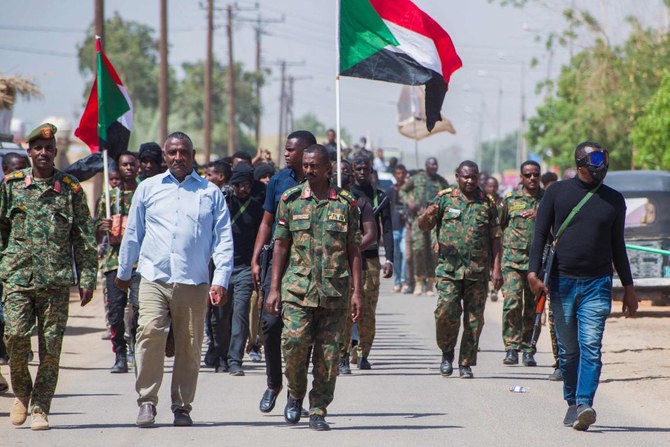
- RSF troops attacked and looted the vast Abu Shouk camp, killing an unknown number of people and wounding at least 13
- The army and RSF have blamed each other for the violence
CAIRO: Tens of thousands of people fled their homes in a camp in the Sudanese city of Al-Fashir, activists said, after a raid by Rapid Support Forces paramilitary forces who are fighting to seize the last army stronghold in the western Darfur region.
RSF troops attacked and looted the vast Abu Shouk camp on Wednesday, killing an unknown number of people and wounding at least 13, locals said, more than a year into Sudan’s war.
Around 60 percent of the more than 100,000 inhabitant fled on Thursday, according to the Coordinating Committee for Refugees and Displaced People, which oversees camps in the region. Fighting continued in other parts of Al-Fashir on Friday, locals said.
The RSF and its allies swept through four other Darfur state capitals last year, and were blamed for a campaign of ethnically driven killings against non-Arab groups and other abuses in West Darfur — accusations they have dismissed.
There was no immediate comment from the RSF or the army on the latest clashes in Al-Fashir, a historic center of power. Both have blamed each other for the violence.
The UN special adviser on the prevention of genocide said this week there was a risk of genocide, and allegations that it was already taking place.
Civilians in Al-Fashir and other parts of Darfur were being targeted on the basis of their identity and skin color, Alice Wairimu Nderitu told the UN Security Council on Tuesday.
Abu Shouk is home to survivors of the violence in Darfur two decades ago, where janjaweed militias, the precursors to the RSF, fought alongside the Sudanese army and were accused of genocide.
About half a million more people moved into Al-Fashir during the ongoing war that broke out between the army and the RSF in the capital Khartoum in April 2023, as long-simmering tensions over integrating the two forces came to a head.
At least 85 people have died at the only functioning hospital in the south of Al-Fashir since May 10, according to medical charity Médecins Sans Frontières (MSF).
The total number of casualties is much larger as civilians hit by fighting in the north, east, and south of the city have not been able to reach medics, MSF and residents say.
The RSF has accused the army of using human shields as well as carrying out extensive air strikes, including destroying Al-Fashir’s power station.



